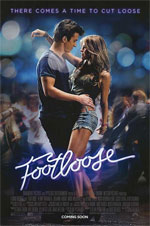Review
>
FOOTLOOSE: Watch It At Home – Faithfully Reproduces the Original For Good and Bad
 1980s week at the multiplex continues with a remake of FOOTLOOSE, a trip back to the territory of Herbert Ross’s 1984 hit. (Financially, by the way, there was no contest between the 1980s versions of this weekend’s entries: the original Footloose grossed $80M, while John Carpenter’s The Thing only managed $20M 2 years earlier.)
1980s week at the multiplex continues with a remake of FOOTLOOSE, a trip back to the territory of Herbert Ross’s 1984 hit. (Financially, by the way, there was no contest between the 1980s versions of this weekend’s entries: the original Footloose grossed $80M, while John Carpenter’s The Thing only managed $20M 2 years earlier.)Meddling with Footloose isn’t exactly like defacing Citizen Kane–while the movie made a lot of money, it was never iconic in the way that Saturday Night Fever was in 1977, or that The Breakfast Club would be in 1985–but not to worry, it’s been treated with a remarkable amount of respect. In fact, under Craig Brewer’s direction, the surprise of the new Footloose is how sturdy the old script (the revised version is credited to Brewer and original screenwriter Dean Pitchford) has turned out to be.
For anyone who missed the 80s, the story is set in the small town of Bomont, where teenager Ren McCormack (Kenny Wormald in the Kevin Bacon role) moves from the big city. (In 1984, his hometown was Chicago; this time it’s Boston. Also, Ren has a more tragic back-story this time–instead of arriving in Bomont with his mom, he’s moving in with his uncle and aunt after having nursed his mother until her death from leukemia.) Ren feels stifled as soon as he arrives, and he doesn’t even know the bad news: as a result of a fatal car crash several years earlier, whose victims included the son of the local minister (Dennis Quaid now, John Lithgow then), the town has passed a variety of ordinances to control teen behavior, the most egregious being a ban on any public dancing that isn’t supervised by the church or school. Ren also makes the acquaintance of the minister’s hot, rebellious daughter Ariel (Julianne Hough in lieu of Lori Singer), and together, they unite the town’s other teens to fight the good fight for free dancing in Bomont.
 The remake is quite faithful to the original, including any number of overt and subtle nods to Ross’s film. However, the politics–which weren’t exactly radical even then–have been toned down (there’s no longer a book burning to teach the minister he’s gone too far), the sexuality is slightly more open (although Ren and Ariel still share only a setting-sun kiss), and the soundtrack mixes some of the original pop songs with country and hip-hop. So this isn’t Gus Van Sant’s shot-by-shot reenactment of Psycho, but the fidelity does mean that as in 1984, the movie slows down quite a bit in the second half as it begins to take itself seriously and Ren morphs from a smartass city boy to an extremely earnest young politician who knows when to quote from the Bible.
The remake is quite faithful to the original, including any number of overt and subtle nods to Ross’s film. However, the politics–which weren’t exactly radical even then–have been toned down (there’s no longer a book burning to teach the minister he’s gone too far), the sexuality is slightly more open (although Ren and Ariel still share only a setting-sun kiss), and the soundtrack mixes some of the original pop songs with country and hip-hop. So this isn’t Gus Van Sant’s shot-by-shot reenactment of Psycho, but the fidelity does mean that as in 1984, the movie slows down quite a bit in the second half as it begins to take itself seriously and Ren morphs from a smartass city boy to an extremely earnest young politician who knows when to quote from the Bible.Herbert Ross started as a choreographer, and by the time he made the original Footloose, his films as a director included the dance-intensive Goodbye, Mr. Chips, Funny Lady, The Turning Point, Nijinsky and Pennies From Heaven. (Although it turned out to be one of his biggest hits, the teen-oriented Footloose was originally considered a step back for Ross after the classy films he’d been making for more than a decade, something he undertook because of the recent flops of Nijinsky, Pennies and a couple of Neil Simon vehicles.) One of the reasons the original Footloose is remembered so fondly is because of his very effective dance sequences, and a disappointment of the new film is that although Craig Brewer’s Hustle & Flow and Black Snake Moon were deeply engaged with music, Brewer turns out not to be very gifted as a director of dance. Wormald and Hough are both trained musical performers and–unlike Bacon and Singer–able to pull off their own numbers without doubles, but you could barely tell that from the flat, rhythmless way most of the dances are shot and edited.
The casting is uneven. Wormald simply doesn’t have Kevin Bacon’s acting chops (by the time he did Footloose, Bacon had already been one of the leads in Diner, among other films), and Dennis Quaid, although a fine actor, was simply the wrong choice as the minister; pursed-lips disapproval isn’t something that comes to him naturally, certainly not as compared with John Lithgow in the first film. Hough, on the other hand, is charismatic and surprisingly strong as Ariel, even in the heavy-lifting acting scenes toward the end. And Teller, like Chris Penn before him, practically steals the movie out from under the leads with great timing and some inspired comic dancing.
Did Footloose need to be remade? Of course not, although better that the studios play around with a negligible old hit like this than a genuine classic. And it hasn’t been particularly improved, on balance. But as in 1984, it remains an entertaining story with some tuneful songs that provides diversion for a couple of hours.


